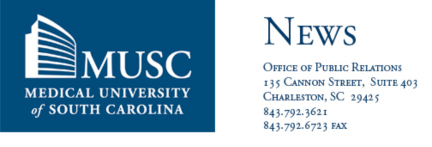
Dec. 14, 2011
CHARLESTON -- As 2011 comes to a close, the work at the new Sexual Behaviors Clinic and Laboratory in the Forensics Psychiatry program is just beginning. Directed by R. Gregg Dwyer, M.D., Ed.D, MUSC Department of Psychiatry and Behavioral Sciences associate professor and Forensic Psychiatry Program director, the clinic-lab is one of only two in the state with a research certification. It is also one of the few on the East Coast with the capacity to conduct clinical, psychological, and physiological assessments of sexual behaviors for use by the criminal justice system and treatment professionals. Personnel serve as consultants to several state agencies and the federal government on the topic of sexual offenses. Services also include offering educational presentations to legal and health care professionals on the topic of persons who commit sexual abuse.
"MUSC forensic psychiatry researchers are working to identify causes, interventions, and prevention strategies for sexually abusive behavior. This is a difficult area of study because the majority of potential study subjects are in the custody of, or otherwise under the supervision of, the criminal justice system," Dwyer said. "Our ultimate goal is to prevent sexual abuse victimization by understanding these abusive acts and the people who commit them."
As Thomas Uhde, M.D., Department of Psychiatry and Behavioral Sciences chairman, noted, MUSC is one of the few places with the scientific and laboratory expertise poised to answer these questions by tapping into the multidisciplinary experience and specialized training of its staff. "This department is one of the few centers in the country both treating patients of sexual abuse and trying to find more effective ways to prevent it," he said. "A concern we have going forward is the limitation of funding for development and implementation of more effective predator prevention programs. Perhaps the tragic news recently highlighted in the media will promote research in this area and lead to more effective efforts to address this major public health problem." Uhde was confident that the departmentís well-established National Crime Victims Research and Treatment Center (NCVRC) and new studies through the Forensic Psychiatry Program position MUSC at the forefront of addressing this public health issue.
According to the MUSC NCVRC, nearly 35 million adults come into contact with more than 70 million children in youth-serving organizations such as day care facilities, schools, recreational programs, churches and religious organizations, youth activity organizations, and sports leagues each year. Estimates indicate that approximately 1 in 4 girls, and 1 in 6 boys, will be sexually assaulted before they turn 18. Although the true prevalence of child sexual abuse is not known, as many victims do not disclose or report the abuse, local advocacy group Darkness to Light states on their website there will be 500,000 babies born in the United States this year that will be sexually abused before they turn 18. This news is sobering, and Dwyer and the forensic team are currently working on multiple externally-funded studies to reduce this number as quickly as possible. Those studies are focused on internet-based sexual offending against children; sexual offenders considered for civil commitment under the stateís Sexual Violent Predator Act; and paraphilias, the category of illness which has as its key criteria some component of sexual interest. More information on these individual studies is available upon request.
About MUSC
Founded in 1824 in Charleston, The Medical University of South Carolina is the oldest medical school in the South. Today, MUSC continues the tradition of excellence in education, research, and patient care. MUSC educates and trains more than 3,000 students and residents, and has nearly 11,000 employees, including 1,500 faculty members. As the largest non-federal employer in Charleston, the university and its affiliates have collective annual budgets in excess of $1.7 billion. MUSC operates a 750-bed medical center, which includes a nationally recognized Children's Hospital, the Ashley River Tower (cardiovascular, digestive disease, and surgical oncology), and a leading Institute of Psychiatry. For more information on academic information or clinical services, visit www.musc.edu or www.muschealth.com.
#####